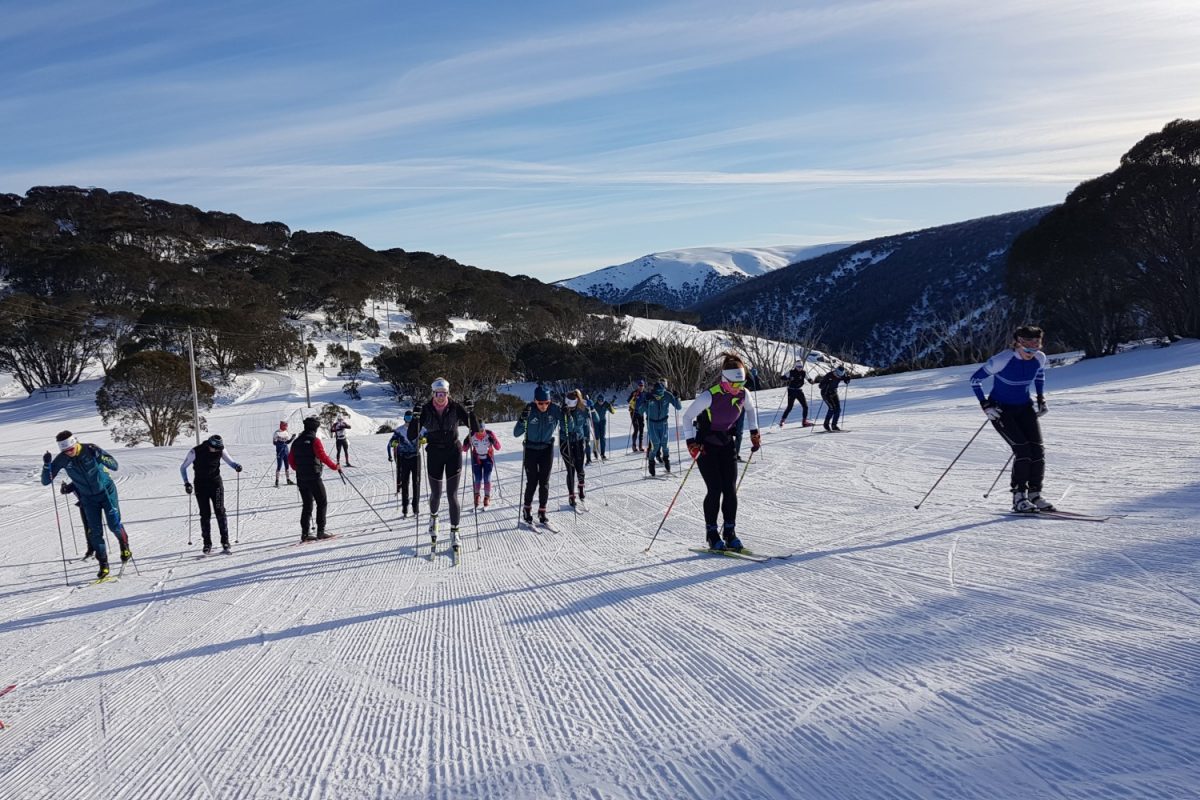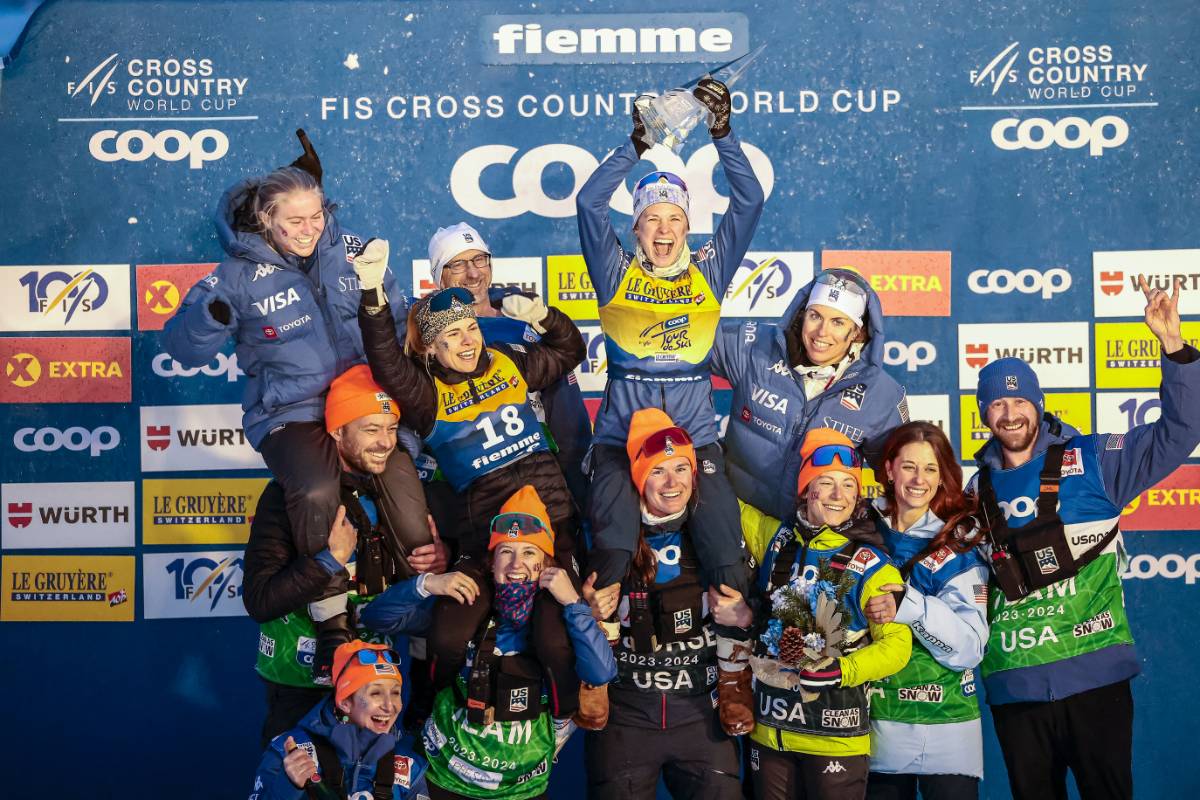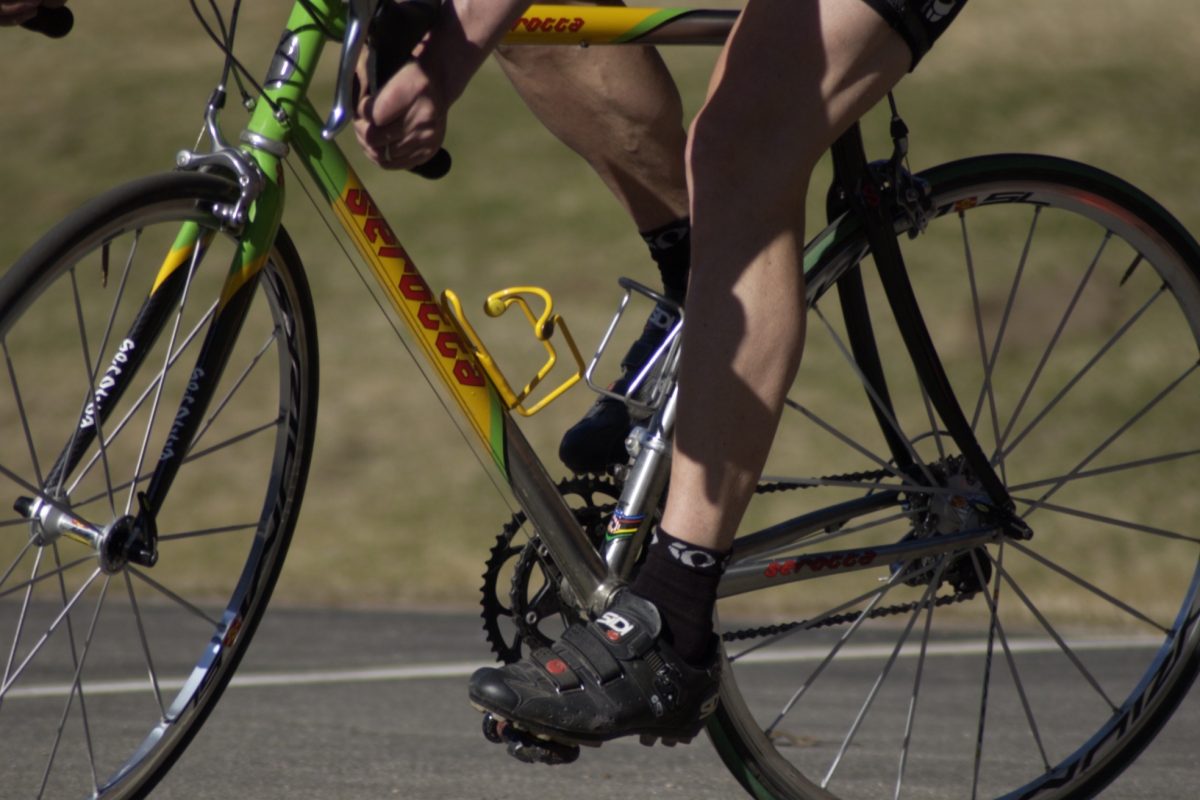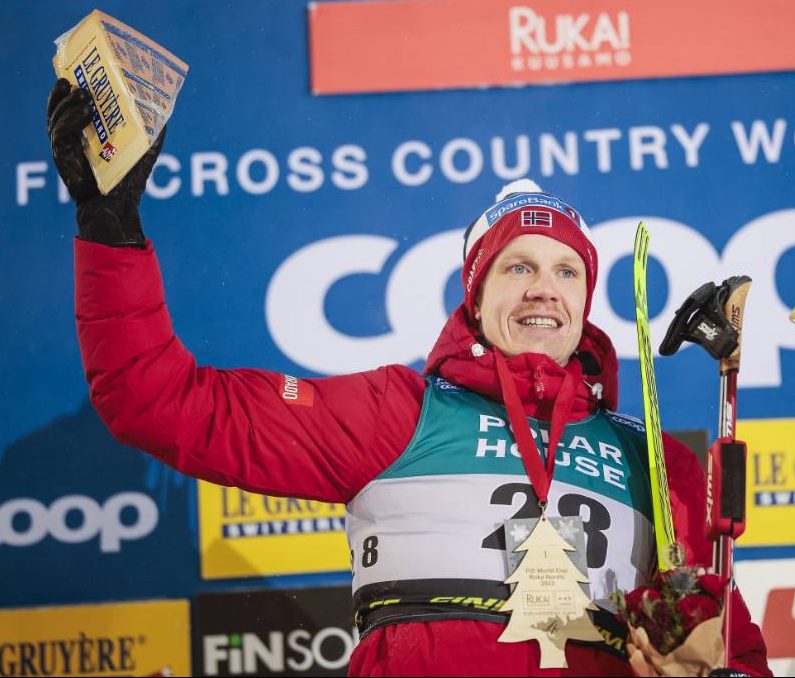
Jan Thomas Jenssen (NOR) hadn’t been entered in a World Cup race since 2020. On Sunday in Ruka, the highlight to Jenssen’s weekend of racing was expected to be his start in the 20 k, not his finish. But something strange was swirling in the chill Arctic air, and Sunday was one for the dark horses. In the final stretch of Sunday’s race that bent two unlikely skiers—Michal Novak (CZE), and the 27 year-old Jenssen—emerged from a pack of World Champions and Olympic medalists. Jenssen rounded the final corner on Ruka’s World Cup weekend to find no one—not one skier—between him and the finish line. Norwegian men would sweep the weekend, but they would do so with a most unlikely trio: Erik Valnes winning the Men’s Sprint on Friday, a 10 k Classic victory on Saturday from Martin Loewstroem Nyenget, and Jan Thomas Jenssen on Sunday.
Gus Schumacher led American finishers with a tremendous 16th place. Scott Patterson remained with Schumacher until the last, finishing 20th, while Zanden McMullen pulled up to the finish in 28th to round out a trio of Americans in the top 30. John Steel Hagenbuch scored the best result of his young World Cup career, taking 45th in just his fourth World Cup start. Zak Ketterson was 52nd, Luke Jager 68th, and Ben Ogden 71st. Among Canadians, Antoine Cyr finished 26th, Olivier Leveille 40th, Xavier McKeever 46th, Graham Ritchie 58th, Leo Grandbois 64th.
There are two substantial take-aways from the World Cup’s opening weekend in Ruka: (1) the Norwegian men’s team is still the dominant force in men’s skiing, animating almost all of the races and filling out most of its lead packs and sprint finals. (2) Ski racing is magical: terrain, weather, conditions, and circumstances can still align in such a way that an athlete who’s worked hard and steadily for years may, on any given day, find himself victorious.
Consider how Jan Thomas Jenssen ended up in the field Sunday. He had earned a single discretionary start from the Norwegian national team after a steady season’s-worth of races in last year’s Scandinavian Cup (the second-tier of FIS competition) in which Jenssen finished second. The Overall winner of the Scandinavian Cup earns an automatic World Cup bid for Period I. Last year, Jenssen’s countrymen Harald Oestberg Amundsen won the Scandinavian Cup; Amundsen also proved his mettle in Sunday’s action, ending up with a podium finish in third place. Jenssen likely wouldn’t have gotten a start in Ruka in any other year. For the first time since Ruka began hosting the World Cup opener 15 years ago, Sunday’s race was a mass start contest rather than a pursuit based on Saturday’s classic results.
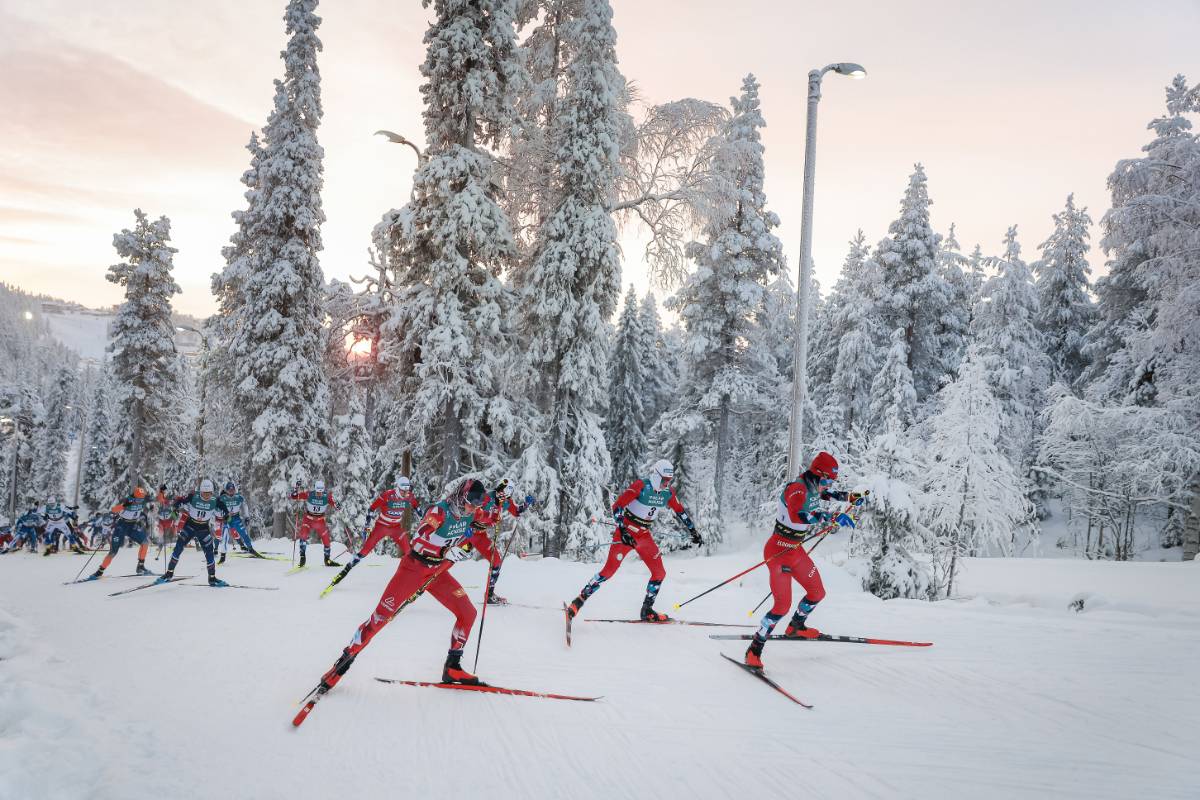
Also contributing to the potential for Jenssen’s unlikely victory was the form of the usual dominant figures in the men’s field. Johannes Hoesflot Klaebo was notably off-form for a third day in a row, helping pull a duo of Americans, Schumacher and Patterson, to a 16th place and 20th place, respectively, before easing across the finish line in 21st place. Saturday’s winner, Nyenget, followed an early agitation from Austrian Mika Vermeulen that left him out of the final running, while 2023 World Cup Distance Globe winner, Paal Golberg (NOR), was left struggling to maintain his place in the lead pack rather than searching for ways to drop it.
All these circumstances aligned for Jenssen: an all out effort, a World Cup win, and a loss for words. “I don’t even know what to say,” was Jenssen’s only statement to FIS media after the race, before he headed to his first ever podium on the sport’s biggest stage.
Men’s 20 k Freestyle Mass Start
There were other, bigger forces, at play on Sunday, too. Ruka’s 2.5 k course is composed of a long, steep, steady uphill, followed by a long downhill that wound into the stadium. In warmer, icy conditions, that set-up may have allowed break-away attacks to gain enough ground to snap the field on the downhill. This was Ruka, above the Arctic circle, in November, though. Cold, dry snow was the order of the day; as a result, the field largely acquiesced to the fact that the long downhill would serve to mitigate punchy efforts rather than help them succeed.
Ruka’s course conditions also allowed competitors, coaches, and wax technicians to worry less about the effects of the new non-fluoro wax protocols. After yesterday’s 10 k Classic, US Ski Team Coach Jason Cork said that the cold, powdery snow in Ruka—where fluoros and their characteristic moisture-resistance have the least effect—probably leaves open the question of the new wax protocols effect on skis. “It’s hard to know for certain [what the effect will be],” said Cork. “There are a lot of new products coming out—nearly daily—but our expectations going into the season was that the non-fluoro rule would create the least impact in cold, dry conditions like we’ve seen in Ruka.”
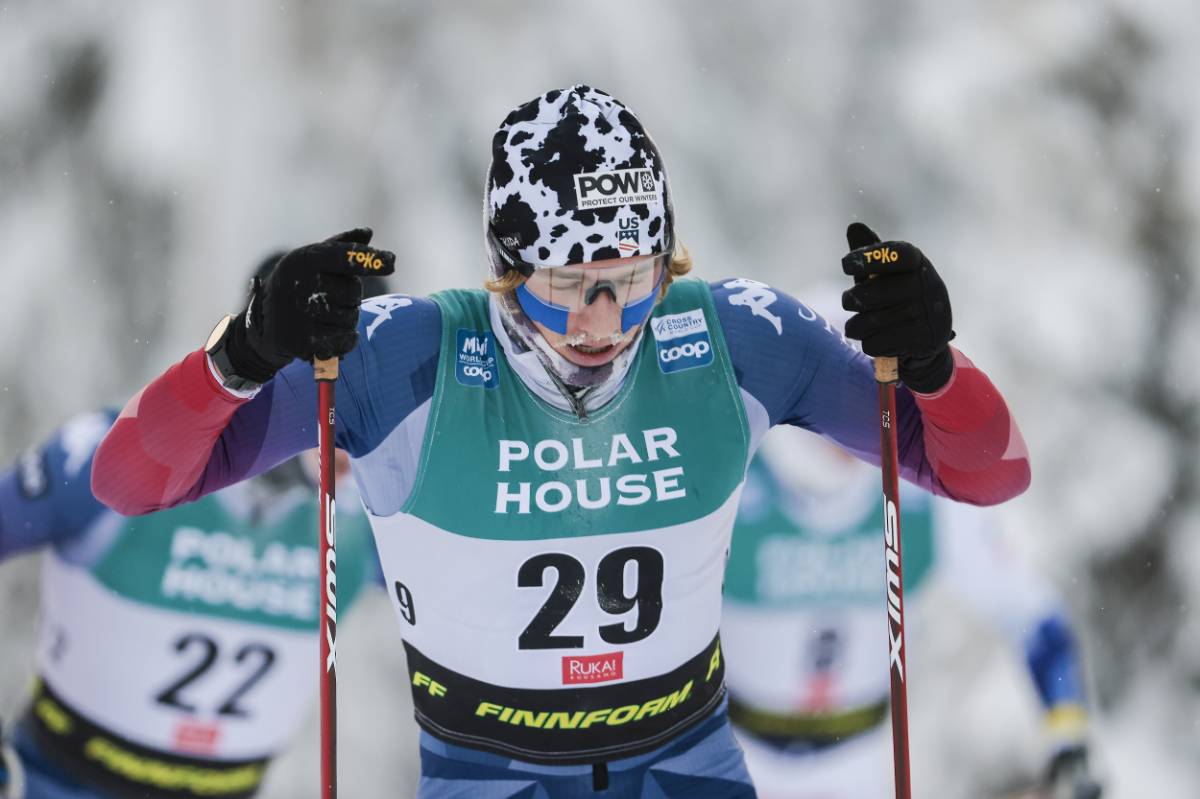
All of this created a mass-start race that stretched rather than snapped, as the field largely stayed together over the first 10 k. Some early action occurred when Mika Vermeulen (AUT) pressed the issue on the downhill leading into the stadium at the 5 k checkpoint. He was joined by Nyenget, but by 10 k the break-away was looking back, anticipating being gathered up by the pack. Through the early kilometers, Americans Schumacher, Patterson, Ogden, and McMullen remained in contact with each other, hovering around the 25th-30th spots in the pack.
By the 10 k mark, a pair of Frenchmen—Jules LaPierre and Hugo LaPalus—had started to push to the front in an apparent counter to the Vermeulen/Nyenget move, before Simen Hegstad Krueger (NOR) pushed into the final downhill in a move that animated the pack and created a split. By 12.5 k, there was a group of Norwegian’s at the front that slowly, but surely, was joined and punctuated by other nationalities. There were the Frenchmen, Britain’s Andrew Musgrave, Switzerland’s Beda Klee, Vermeulen, and Novak . A break occurred behind the first 15 skiers; this chase group was where Schumacher, Patterson, and notably, Klaebo, all ended up skiing for the final five kilometers.
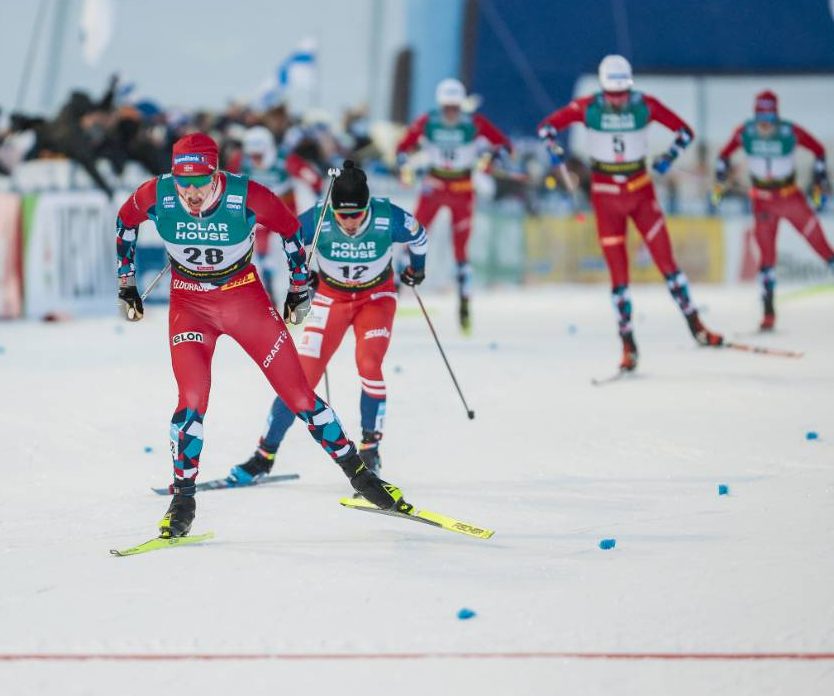
The lead group remained compact despite jockeying, with the decisive moment coming in the seventh lap. “The leaders surged or the bonus points, blasted through and kept going,” said Schumacher in post-race comments to FasterSkier. In the final run-in, true urgency set up a sprint. That’s when Novak took his shot, followed by Jenssen. The duo broke clear in a hop-skate towards the Ruka stadium, with Jenssen’s line allowing him to steer clear of Novak, and towards his own first ever World Cup win.
The American action for the day came in the chase group, where Schumacher was able to create a bit of separation and win the final push to 16th place. “I felt like if I tried to cover that [gap], I’d lose time up the big hill on the last lap,” Schumacher said. “So I just tried to relax into the final.” The result was Schumacher’s best-ever showing at the Ruka World Cup opener, marking an auspicious beginning to the Alaskan’s campaign. “The goal for Ruka is always not to stress too much about where I’m at,” said Schumacher. “But that’s easier said than done. Mostly, I’m just a little relieved to know I’m in a solid place and can just kind of go with the flow and not do anything crazy from here.”
The World Cup leaves Ruka to head even more North next week, setting up in the Swedish town of Gallivare for a 10 k skate followed by the season’s first Team Relay.
Men’s 20 k Freestyle Mass Start RESULTS
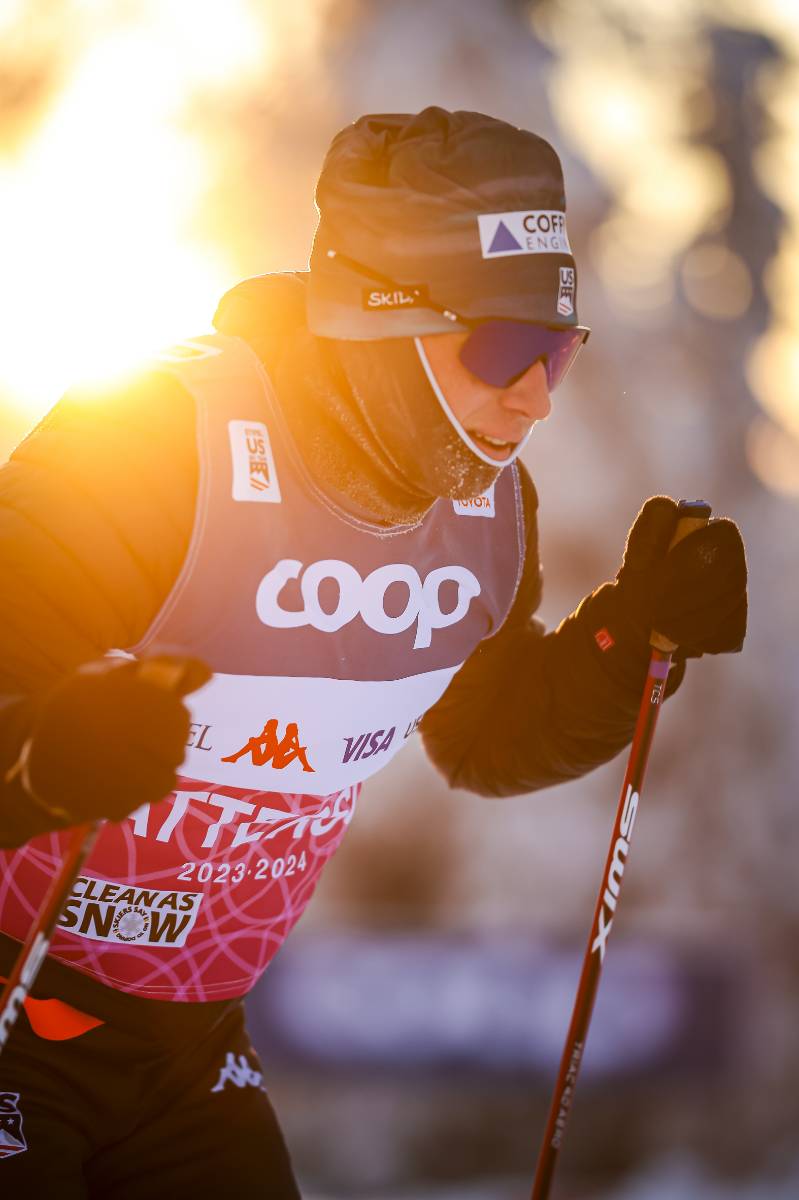
Ben Theyerl
Ben Theyerl was born into a family now three-generations into nordic ski racing in the US. He grew up skiing for Chippewa Valley Nordic in his native Eau Claire, Wisconsin, before spending four years racing for Colby College in Maine. He currently mixes writing and skiing while based out of Crested Butte, CO, where he coaches the best group of high schoolers one could hope to find.

